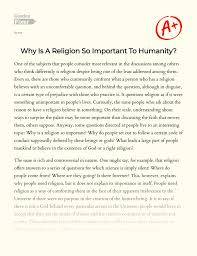Title: Religion: A Source of Meaning, Belonging, and Spiritual Guidance
Introduction:
Religion has played a significant role in human history, shaping cultures, societies, and individual lives. It provides a framework for understanding the world, offering answers to existential questions and guiding individuals in their pursuit of meaning and purpose. In this article, we will explore the multifaceted nature of religion, highlighting its role as a source of meaning, belonging, and spiritual guidance in the lives of believers.
1. Meaning and Purpose:
One of the fundamental aspects of religion is its ability to provide individuals with a sense of meaning and purpose. Religious teachings often offer explanations for life's mysteries, addressing questions about the origins of the universe, the nature of existence, and the ultimate purpose of human life. By providing a narrative that connects individuals to something greater than themselves, religion offers a framework through which believers can find meaning in their experiences and navigate the complexities of life.
2. Belonging and Community:
Religion also serves as a source of belonging and community for many individuals. Places of worship, such as churches, mosques, temples, and synagogues, provide spaces where believers can come together to worship, pray, and engage in communal rituals. These religious communities offer a sense of belonging, social support, and a shared identity based on common beliefs and values. The bonds formed within these communities foster a sense of solidarity, compassion, and collective responsibility.
3. Moral and Ethical Guidance:
Religion often provides a moral and ethical framework that guides believers' behavior and decision-making. Religious texts and teachings offer principles and commandments that believers are encouraged to follow in order to live a virtuous and righteous life. These moral guidelines serve as a compass for believers, helping them navigate ethical dilemmas and make choices that align with their religious convictions. Religion can provide a sense of accountability and help individuals develop a strong moral character.
4. Spiritual Growth and Inner Transformation:
For many believers, religion offers a path towards spiritual growth and inner transformation. Through prayer, meditation, and other spiritual practices, individuals seek to deepen their connection with the divine and cultivate a sense of inner peace, harmony, and transcendence. Religious rituals and ceremonies often serve as opportunities for reflection, introspection, and personal growth. The pursuit of spiritual enlightenment and the development of virtues such as compassion, forgiveness, and gratitude are central to many religious traditions.
5. Source of Comfort and Hope:
During times of adversity, loss, and uncertainty, religion often serves as a source of comfort, solace, and hope. Believers find strength in their faith and the belief that a higher power is guiding and supporting them through difficult times. Religious rituals and practices provide a sense of stability and routine, offering believers a space to express their emotions, seek guidance, and find solace in the face of life's challenges. The belief in an afterlife or a greater purpose can provide hope and reassurance in the face of mortality.
Conclusion:
Religion continues to play a significant role in the lives of millions of people worldwide, offering meaning, belonging, moral guidance, spiritual growth, and comfort. It provides a framework through which individuals can make sense of the world, find purpose, connect with others, and seek transcendence. While religion may manifest differently across cultures and belief systems, its universal appeal lies in its ability to address profound human needs and offer a source of guidance and inspiration in the journey of life.




No comments yet
Be the first to share your thoughts!